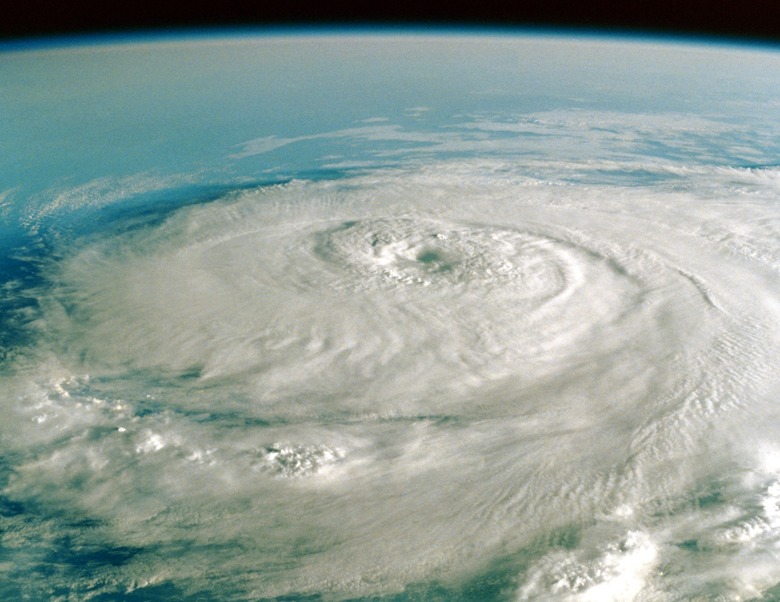What Happens When A Hurricane Occurs?
A hurricane is one of many storm types that can impact humans and potentially cause catastrophic damage. These storms vary in size and intensity, and the aftermath of a storm depends strongly upon the size or strength of the storm and if the storm directly hits an area or not.
How Do Hurricanes Form?
How Do Hurricanes Form?
A hurricane forms over warm, deep seas. The warm air over the surface of the ocean rises into the sky, forming dense clouds. As the air rises, cold air takes its place, is warmed and then rises itself creating a cyclical pattern. Under all the right conditions, this process repeats until it forms one of the strongest types of thunderstorms.
Hurricanes are classified by their strong winds and impressive storm surge. Hurricane strengths are classified using the Saffir-Simpson Hurricane Wind Scale, which has five categories based on a storm's maximum sustained wind speed.
What Happens During a Category 1 Hurricane?
What Happens During a Category 1 Hurricane?
The weakest of the hurricane categories, a Category 1 hurricane is still an impressive storm. A Category 1 hurricane has maximum sustained winds between 74 mph and 95 mph. Even these relatively lower wind speeds can cause extensive damage.
During a Category 1 hurricane, you can experience minor roof damage to the gutters and shingles. Broken tree branches and some toppled trees are also likely. Finally, you can expect damage to power lines resulting in power outages.
What Happens During a Category 2 Hurricane?
What Happens During a Category 2 Hurricane?
During a Category 2 hurricane, you will experience maximum sustained winds between 96 mph and 110 mph. You may experience major roof damage or siding damage to your home. Additionally, many trees with shallow roots can be snapped or knocked over during a Category 2 hurricane. Finally, extensive power outages can be expected.
What Happens During a Category 3 Hurricane?
What Happens During a Category 3 Hurricane?
When wind speeds reach between 111 mph and 129 mph the hurricane falls into Category 3. The National Oceanic and Atmospheric Association classifies Category 3 hurricanes as major storms. During these storms, you can experience damage to your roof or home as well as potential loss of full sections of the roof. Extensive damage to trees may also occur. Finally, power outages and access to city water can be impacted for several days to weeks.
What Happens During a Category 4 Hurricane?
What Happens During a Category 4 Hurricane?
A Category 4 hurricane has maximum sustained winds between 130 mph and 156 mph. It is classified by the NOAA as a major storm. Some homes might experience full roof loss and even damage to walls, including collapses. An area directly struck by a Category 4 hurricane can expect the loss of most trees and powerlines. It can take weeks or months to regain power in these regions because of all the damage and debris blocking vehicular access to the area.
What Happens During a Category 5 Hurricane?
What Happens During a Category 5 Hurricane?
Hurricanes classified as Category 5 have maximum sustained wind speeds greater than 156 mph. As with categories 3 and 4, NOAA classifies these as major storms. You should expect catastrophic damage to regions directly hit by a Category 5 storm. Destruction of many homes, including full loss of roofing and collapse of walls, can be expected.
The majority of trees and power lines will be toppled by a storm of this capacity. This debris will not only result in a full loss of power but also delay workers from restoring power to the area. You can expect regions struck by a Category 5 hurricane to be uninhabitable for several weeks or months.
Cite This Article
MLA
Zinni, Yasmin. "What Happens When A Hurricane Occurs?" sciencing.com, https://www.sciencing.com/happens-hurricane-occurs-4862/. 18 January 2022.
APA
Zinni, Yasmin. (2022, January 18). What Happens When A Hurricane Occurs?. sciencing.com. Retrieved from https://www.sciencing.com/happens-hurricane-occurs-4862/
Chicago
Zinni, Yasmin. What Happens When A Hurricane Occurs? last modified March 24, 2022. https://www.sciencing.com/happens-hurricane-occurs-4862/
